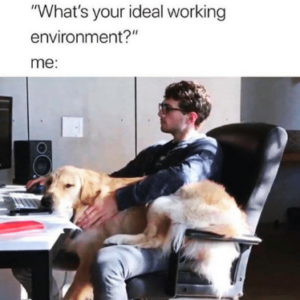It’s no secret that hiring is hard. In fact, it’s one of the most difficult parts of running a business. You know what even harder? Trying to find the perfect candidate for a job, only to have them flake out on you or quit after three months.
The typical hiring process includes searching through resumes to learn about candidates, their work experience and their educational background, however none of that reliably predicts people’s success in a role. The interview or interviews (depending on your process) are crucial to help you figure out if a candidate can handle the uncertainty of a startup environment. You will have to dig a little deeper beyond just what’s on the resume and gauge for yourself if the candidate has what it takes to not only join your team but thrive in a startup environment. Here are 5 sample questions you can ask candidates so you can feel confident that they are a fit for your startup:
Q: Do you like structure and routine OR are you more of an adaptable type of person?
Get a peek into the candidates’ work habits with this question! Though it may not be true for all startups, typically the environment at a small company is built on change and adaptability. Some aspects of the business may be new for people, and they are still figuring things out as they go, so the candidate that you hire should be comfortable with the ever-changing nature of it all. That’s not to say if the candidate prefers structure that they won’t be a good fit, but this question does give you a bit more insight into the type of worker they are and if it’ll fit in your startup environment.

Q: What would cause you to look back after joining a team and know you made the right decision?
Pay close attention here! This question will prompt the candidate to share what motivates them in their work. Maybe they value work-life balance as a benefit the most, or maybe it’s compensation. Either way, as the interviewer, you’ll have to figure out if what you can offer aligns with what the candidate is looking for. For example, an answer like “I’ll know I made the right decision if I’m given a raise 3 months in and then again at the 6-month mark.” could highlight the candidate is more financially driven and could be a higher risk for leaving for another opportunity willing to pay more. It’s important to focus on the if the candidate’s answer aligns with your business values and internal culture.
Side note: The closer you get to expressing who you are as a startup, the better you’ll be at hiring people who are the right match for your business. Nailing your employer branding strategy and staying with the times can help you meet the demands of the talent pool and know exactly what it takes to find, hire, and retain the top talent of today’s market.
Q: Why do you want to work for a startup of this size? Can you tell me about how many people were on your team at XYZ company and how you worked together?
While this is a two-part question, the candidate will have the opportunity to share a few things. First, understanding why they want to work for a startup will help you understand their mindset and whether or not they may be cut out for the job. For example, if a candidate says something like “Being able to make a big impact is something that drives me” shows they are motivated to wear many hats and work until the job gets done. Second, depending on how big their previous team was, you’ll get a sense of how they worked in previous roles. As we know, the larger the team, the more likely someone is to be siloed in their role. Fortunately (or unfortunately, depending on how you feel), a typical startup environment means everyone has multiple responsibilities. A candidate who has only ever worked in a large team atmosphere could find it challenging to juggle multiple priorities. If you’re curious, dig deeper into these concerns in the interview. All in all, this question is meant to get a feel for the size team/organization that the candidate values and figure out if it aligns with what your startup can offer them.
Q: Describe the work environment and culture where you feel the most productive and successful.
By asking questions about where candidates thrive, you’ll be able to better understand what they value the most in their environment and if they’ll fit in the environment that you can offer. Not everyone comes from or has experience working for a startup, however many other experiences that candidates have could speak to their ability to thrive in an ambiguous environment.

Q: Tell me about a time you were asked to do something you weren’t comfortable with. How did you respond?
This is a great question to ask candidates because the fact is, at some startups, you may have to dip your toes into parts of the business that you may not be 100% comfortable or familiar with. The way the candidate answers this question will give you a feel for whether they are flexible and eager, or if they would rather not step outside their comfort zone. Here is an example of an answer that may raise some red flags that the candidate isn’t willing to step outside their comfort zone and wear multiple hats: “Once, my manager assigned me a task from a coworker that was off sick. It made me uncomfortable because I had never done the task before, and I didn’t have much knowledge in the area. I told my manager that they should pass the task off to someone else because I didn’t want to do it.” As a startup, it’s important that the candidate is willing to try new things and do what needs to be done to help their team be successful. This question can reveal whether the candidate is willing to do just that.
With small teams, it’s important to put out feelers to see how candidates would fit in your environment. Do they seem excited to jump in and do what needs to be done, or are they more cut out for big corporations? Keep in mind, there is no ‘perfect’ answer to any of the questions above. It’s up to you as the interviewer to take their answers and piece together a clearer view of if you think the candidate will fit in your startup. Feel free to reach out to us if you need some more guidance when it comes to hiring. We happen to have plenty of tips and tricks.







